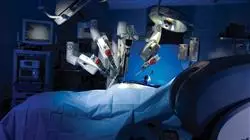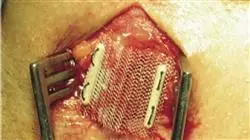University certificate
The world's largest faculty of medicine”
Introduction to the Program
The new scenarios push us to propose new training programs that meet the real needs of the most experienced professionals, so that they can incorporate the advances that are taking place in the surgical practice of the urinary tract"

The Postgraduate diploma in Lower Urinary Tract Surgery comprises possibly the most prevalent part of urological surgical pathology. In addition to lower and pelvic floor surgical anatomy and the latest advances in diagnostic and therapeutic techniques in urology, it covers all the advances in surgical pathology of the bladder, including the new techniques of en bloc transurethral resection, with the support of technology that optimizes the detection of tumors and carcinoma in situ (CIS) in the bladder.
Laparoscopy and more recently robotics have made possible a shorter postoperative period with fewer complications after radical surgery and intestinal bypasses that can now be approached intracorporeally, especially with 3D technology. Lymphadenectomy with fluorescence techniques such as ICG, as well as the treatment of non-tumorous bladder pathology also have their place in this expert.
Prostatic pathology is a very important part of the expert, and possibly the one in which there has been the greatest revolution in terms of surgical techniques in the last decade. As for benign pathology, the appearance of green, holmium and thulium lasers, as well as prostatic vaporization with bipolar technology, and minimally invasive techniques are already revolutionizing the treatment of benign prostatic hyperplasia (BPH). Laparoscopy, 3D laparoscopy, robotics, single port and fluorescence techniques minimize the morbidity of surgical treatment in cases of prostate tumor pathology. The application of techniques for the focal treatment of prostate cancer, avoiding overtreatment in low-risk cases, is also making great progress.
It also includes the treatment of urethral pathology, where open surgery is still used, with the use of buccal mucosa in cases of stenosis, which has significantly improved functional results in recent years.
This Postgraduate diploma in Lower Urinary Tract Surgery is aimed at facilitating the update of surgical procedures and techniques of the lower urinary tract to the specialist, in a practical way through the latest educational technology.
Scientific evidence increases the quality of medical care. Keeping up to date is key to providing better care for the patient with urinary tract problems"
This Postgraduate diploma in Lower Urinary Tract Surgery contains the most complete and up-to-date scientific program on the market. The most important features include:
- Clinical cases presented by experts. Its graphic, schematic and practical contents provide scientific and assistance information on those medical disciplines that are essential for professional practice
- Diagnostic and therapeutic novelties on the care of the surgical nephrourological patient
- Presentation of practical workshops on procedures, diagnostic and therapeutic techniques in nephrourological and lower urinary tract surgery
- Video lessons on the different pathologies and their management
- An algorithm-based interactive learning system for decision-making in the clinical situations presented throughout the course
- Includes theoretical lectures, questions to the expert, discussion forums on controversial issues and individual reflection papers
- Content that is accessible from any fixed or portable device with an Internet connection
This Postgraduate diploma is the best investment you can make when selecting an up-to-date program for two reasons: in addition to updating your knowledge in Lower Urinary Tract Surgery, you will obtain a qualification from TECH Global University"
Its teaching staff includes leading urologists, who contribute their work experience to this training, in addition to other specialists belonging to prestigious scientific societies.
Thanks to its multimedia content elaborated with the latest educational technology, this Postgraduate Diploma will allow the professional a situated and contextual learning, that is, a simulated environment that will provide an immersive learning programmed to train in real situations.
This program is designed around Problem-Based Learning, whereby the physician must try to solve the different professional practice situations that arise throughout the program. This will be done with the help of an innovative interactive video system developed by renowned experts in urological surgery, with extensive teaching experience.
Include the latest developments in Lower Urinary Tract Surgery in your surgical practice and improve your patient's prognosis"

It includes high definition images and real clinical cases to bring surgical practice as close as possible to the development of the program"
Why study at TECH?
TECH is the world’s largest online university. With an impressive catalog of more than 14,000 university programs available in 11 languages, it is positioned as a leader in employability, with a 99% job placement rate. In addition, it relies on an enormous faculty of more than 6,000 professors of the highest international renown.

Study at the world's largest online university and guarantee your professional success. The future starts at TECH”
The world’s best online university according to FORBES
The prestigious Forbes magazine, specialized in business and finance, has highlighted TECH as “the world's best online university” This is what they have recently stated in an article in their digital edition in which they echo the success story of this institution, “thanks to the academic offer it provides, the selection of its teaching staff, and an innovative learning method aimed at educating the professionals of the future”
A revolutionary study method, a cutting-edge faculty and a practical focus: the key to TECH's success.
The most complete study plans on the university scene
TECH offers the most complete study plans on the university scene, with syllabuses that cover fundamental concepts and, at the same time, the main scientific advances in their specific scientific areas. In addition, these programs are continuously being updated to guarantee students the academic vanguard and the most in-demand professional skills. In this way, the university's qualifications provide its graduates with a significant advantage to propel their careers to success.
TECH offers the most comprehensive and intensive study plans on the current university scene.
A world-class teaching staff
TECH's teaching staff is made up of more than 6,000 professors with the highest international recognition. Professors, researchers and top executives of multinational companies, including Isaiah Covington, performance coach of the Boston Celtics; Magda Romanska, principal investigator at Harvard MetaLAB; Ignacio Wistumba, chairman of the department of translational molecular pathology at MD Anderson Cancer Center; and D.W. Pine, creative director of TIME magazine, among others.
Internationally renowned experts, specialized in different branches of Health, Technology, Communication and Business, form part of the TECH faculty.
A unique learning method
TECH is the first university to use Relearning in all its programs. It is the best online learning methodology, accredited with international teaching quality certifications, provided by prestigious educational agencies. In addition, this disruptive educational model is complemented with the “Case Method”, thereby setting up a unique online teaching strategy. Innovative teaching resources are also implemented, including detailed videos, infographics and interactive summaries.
TECH combines Relearning and the Case Method in all its university programs to guarantee excellent theoretical and practical learning, studying whenever and wherever you want.
The world's largest online university
TECH is the world’s largest online university. We are the largest educational institution, with the best and widest online educational catalog, one hundred percent online and covering the vast majority of areas of knowledge. We offer a large selection of our own degrees and accredited online undergraduate and postgraduate degrees. In total, more than 14,000 university degrees, in eleven different languages, make us the largest educational largest in the world.
TECH has the world's most extensive catalog of academic and official programs, available in more than 11 languages.
Google Premier Partner
The American technology giant has awarded TECH the Google Google Premier Partner badge. This award, which is only available to 3% of the world's companies, highlights the efficient, flexible and tailored experience that this university provides to students. The recognition as a Google Premier Partner not only accredits the maximum rigor, performance and investment in TECH's digital infrastructures, but also places this university as one of the world's leading technology companies.
Google has positioned TECH in the top 3% of the world's most important technology companies by awarding it its Google Premier Partner badge.
The official online university of the NBA
TECH is the official online university of the NBA. Thanks to our agreement with the biggest league in basketball, we offer our students exclusive university programs, as well as a wide variety of educational resources focused on the business of the league and other areas of the sports industry. Each program is made up of a uniquely designed syllabus and features exceptional guest hosts: professionals with a distinguished sports background who will offer their expertise on the most relevant topics.
TECH has been selected by the NBA, the world's top basketball league, as its official online university.
The top-rated university by its students
Students have positioned TECH as the world's top-rated university on the main review websites, with a highest rating of 4.9 out of 5, obtained from more than 1,000 reviews. These results consolidate TECH as the benchmark university institution at an international level, reflecting the excellence and positive impact of its educational model.” reflecting the excellence and positive impact of its educational model.”
TECH is the world’s top-rated university by its students.
Leaders in employability
TECH has managed to become the leading university in employability. 99% of its students obtain jobs in the academic field they have studied, within one year of completing any of the university's programs. A similar number achieve immediate career enhancement. All this thanks to a study methodology that bases its effectiveness on the acquisition of practical skills, which are absolutely necessary for professional development.
99% of TECH graduates find a job within a year of completing their studies.
Postgraduate Diploma in Lower Urinary Tract Surgery
Lower Urinary Tract Surgery is a complex area of medicine that deals with pathologies affecting the bladder, urethra and prostate. In recent years, there have been significant advances in this field, leading to the development of new, safer and more effective surgical techniques and procedures. It is therefore essential for urologists to be aware of these advances in order to perfect their interventional practice. To this end, TECH has created the Postgraduate Diploma in Lower Urinary Tract Surgery, which will provide you with the most cutting-edge knowledge in this field to ensure your optimal professional update.
Take a first class medical update program
The Postgraduate Diploma in Lower Urinary Tract Surgery is an excellent option for any urologist who wishes to update his or her specialty. Throughout this academic experience, you will learn about the latest advances in laparoscopic anatomy, identify cutting-edge therapeutic techniques in Urology or detect recent trends in treating surgical pathology of the bladder. In this way, you will be at the medical forefront without the need to give up your personal and professional duties, since the delivery of this program is 100% online.







